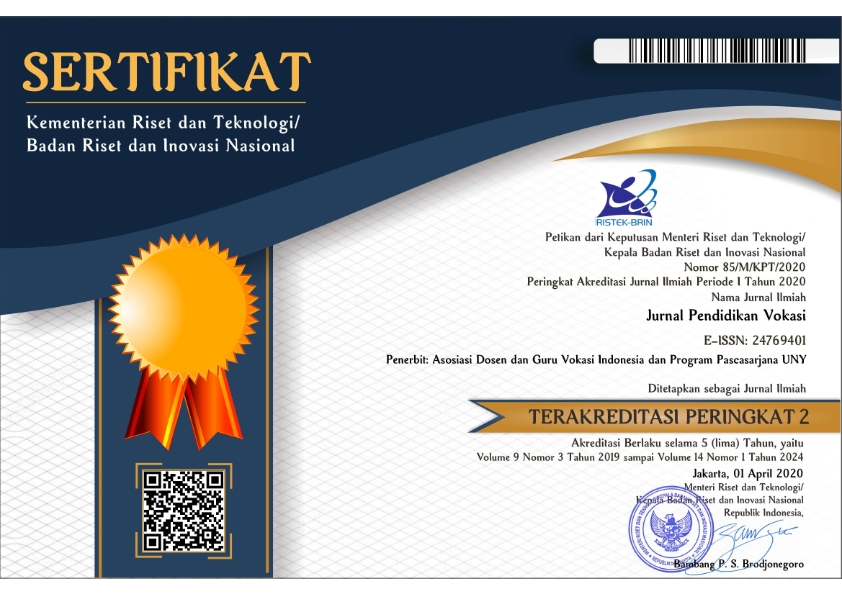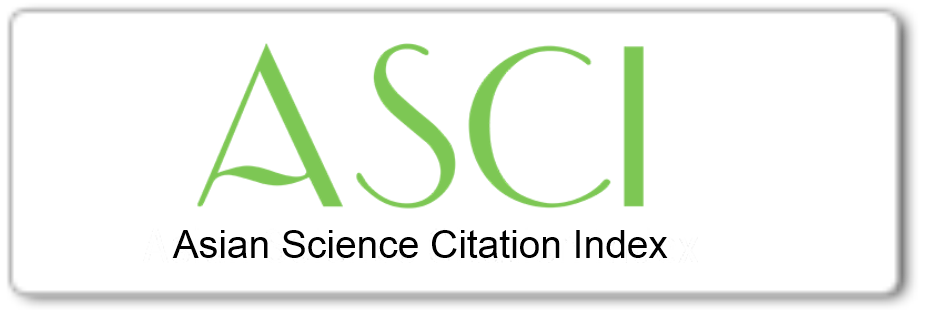Vocational school teachers’ readiness in implementing Curriculum 2013 revised edition in Cilacap Regency
Nuchron Nuchron, Universitas Negeri Yogyakarta, Indonesia
Abstract
Keywords
Full Text:
FULLTEXT PDFReferences
Alanazi, T. R., Khalaf, B., & Rasli, A. (2013). Overview of path-goal leadership theory. Jurnal Teknologi, 64(2), 49–53. Retrieved from https://jurnalteknologi.utm.my/index.php/jurnalteknologi/article/view/2235/1779
Alma, B. (2012). Guru profesional: Menguasai metode dan keterampilan mengajar. Jakarta: Alfabeta.
Ariff, N., Mansor, M., & Yusof, H. (2017). Preparing pre-service teacher in professionalism practice. International Journal of Academic Research in Business and Social Sciences, 7(2), 749–756. https://doi.org/10.6007/IJARBSS/v7-i2/2683
Arifin, M., & Barnawi, B. (2014). Kinerja guru profesional. Yogyakarta: Ar-Ruzz Media.
Bantwini, B. D. (2010). How teachers perceive the new curriculum reform: Lessons from a school district in the Eastern Cape province, South Africa. International Journal of Educational Development, 30(1), 83–90. Retrieved from http://hdl.handle.net/20.500.11910/4639
Barizi, A. (2009). Menjadi guru unggul. Yogyakarta: Ar Ruzz Media.
Bayrakcı, M. (2009). In-service teacher training in Japan and Turkey: A comparative analysis of institutions and practices. Australian Journal of Teacher Education, 34(1), 10–22. https://doi.org/10.14221/ajte.2009v34n1.2
Coenders, F., & Verhoef, N. (2019). Lesson study: Professional development (PD) for beginning and experienced teachers. Professional Development in Education, 45(2), 217–230. https://doi.org/10.1080/19415257.2018.1430050
Coleman, J. M., & Morales, H. (2018). Leadership. In A. Mugford & J. G. Cremades (Eds.), Sport, Exercise, and Performance Psychology (pp. 382–406). New York, NY: Routledge. https://doi.org/10.4324/9780429438851-25
Davies, B. (2004). Success and sustainability: Developing the strategically focused school. School Leadership & Management, 24(1), 11–27. https://doi.org/10.1080/1363243042000172796
Davies, B., & Brundrett, M. (2010). Developing successful leadership. Heidelberg: Springer.
Davis, E. A., & Varma, K. (2008). Supporting teachers in productive adaptation. In Y. Kali, M. C. Linn, & J. E. Roseman (Eds.), Designing coherent science education (pp. 94–122). New York, NY: Teachers College Press.
Day, C. (2000). Effective leadership and reflective practice. Reflective Practice, 1(1), 113–127. https://doi.org/10.1080/713693134
Day, D. V., Fleenor, J. W., Atwater, L. E., Sturm, R. E., & McKee, R. A. (2014). Advances in leader and leadership development: A review of 25 years of research and theory. The Leadership Quarterly, 25(1), 63–82. https://doi.org/10.1016/J.LEAQUA.2013.11.004
Devos, G., Tuytens, M., & Hulpia, H. (2014). Teachers’ organizational commitment: Examining the mediating effects of distributed leadership. American Journal of Education, 120(2), 205–231. https://doi.org/10.1086/674370
Duignan, P. (2004). Forming capable leaders: From competence to capabilities. New Zealand Journal of Education Leadership, 19(2), 5–13.
Duke, D. (1987). School leadership and instructional improvement. New York: NY: Random House.
Fullan, M. G., & Park, P. (1981). Curriculum implementation: A resource booklet. Toronto: Ontario Ministry of Education.
Fullan, M., & Pomfret, A. (1977). Research on curriculum and instruction implementation. Review of Educational Research, 47(2), 335–397. https://doi.org/10.2307/1170134
Garza Jr, E., Drysdale, L., Gurr, D., Jacobson, S., & Merchant, B. (2014). Leadership for school success: Lessons from effective principals. International Journal of Educational Management, 28(7), 798–811. https://doi.org/10.1108/IJEM-08-2013-0125
Gürsoy, E. (2013). Improving practicum for a better teacher training. Procedia - Social and Behavioral Sciences, 93, 420–425. https://doi.org/10.1016/J.SBSPRO.2013.09.214
Hsiao, H.-C., Chen, M.-N., & Yang, H.-S. (2008). Leadership of vocational high school principals in curriculum reform: A case study in Taiwan. International Journal of Educational Development, 28(6), 669–686. https://doi.org/10.1016/J.IJEDUDEV.2007.12.002
Information Resources Management Association. (2018). Teacher training and professional development: Concepts, methodologies, tools, and applications. Hershey, PA: IGI Global.
International Labour Organization. (2012). Handbook of good human resource practices in the teaching profession (8th ed.). Boston, MA: Pearson.
Jacobson, S., & Bezzina, C. (2008). The effects of leadership on student academic/affective achievement. In G. Crow, J. Lumby, & P. Pashiardis (Eds.), The international handbook on the preparation and development of school leaders (pp. 80–102). Thousand Oaks, CA: Sage Publications.
Katuuk, D. A. (2014). Manajemen implementasi kurikulum: Strategi penguatan implementasi Kurikulum 2013. Jurnal Cakrawala Pendidikan, 1(1), 13–26. https://doi.org/10.21831/cp.v1i1.1858
Krajcik, J., McNeill, K. L., & Reiser, B. J. (2008). Learning-goals-driven design model: Developing curriculum materials that align with national standards and incorporate project-based pedagogy. Science Education, 92(1), 1–32. https://doi.org/10.1002/sce.20240
Kyriakides, L., Creemers, B. P. M., & Antoniou, P. (2009). Teacher behaviour and student outcomes: Suggestions for research on teacher training and professional development. Teaching and Teacher Education, 25(1), 12–23. https://doi.org/10.1016/j.tate.2008.06.001
Lembaga Penjaminan Mutu Pendidikan (Institute for Educational Quality Assurance). (2016). Laporan peta mutu pendidikan Kabupaten Cilacap Provinsi Jawa Tengah berbasis SNP tahun 2016 (IEQA).
Liaw, E.-C. (2009). Teacher efficacy of pre-service teachers in Taiwan: The influence of classroom teaching and group discussions. Teaching and Teacher Education, 25(1), 176–180. https://doi.org/10.1016/J.TATE.2008.08.005
Loucks-Horsley, S., Hewson, P. W., Love, N., & Stiles, K. (1998). Designing professional development for teachers of science and mathematics. Madison, WI: National Institute for Science Education.
Lynch, J. A. (1937). Teacher training. Peabody Journal of Education, 15(3), 113–118. Retrieved from https://www.jstor.org/stable/1488320
Majid, N. A., Jelas, Z. M., & Rahman, S. (2010). Communication skills and work motivation amongst expert teachers. Procedia - Social and Behavioral Sciences, 7, 565–567. https://doi.org/10.1016/J.SBSPRO.2010.10.075
Mallon, M. (2017). Leadership development. Public Services Quarterly, 13(2), 90–97. https://doi.org/10.1080/15228959.2017.1302391
Mappalotteng, A. M. (2014). Improving vocational teacher professionalism through lesson study. IOSR Journal of Research & Method in Education (IOSR-JRME), 4(6), 11–14. Retrieved from http://www.iosrjournals.org/iosr-jrme/papers/Vol-4 Issue-6/Version-1/C04611114.pdf
Miller, J. P., & Seller, W. (1985). Curriculum perspectives and practice. New York, NY: Longman.
Miller, R. (2008). Leadership: Theory and practice. In S. F. Davis & W. Buskist (Eds.), 21st century psychology: A reference handbook (vol. 2, pp. II-152-II–163). Thousand Oaks, CA: Sage Publications. https://doi.org/10.4135/9781412956321.n68
Mulyasa, E. (2017). Pengembangan dan implementasi Kurikulum 2013 (10th ed.). Bandung: Rosdakarya.
Ng, S., & Szeto, S. E. (2016). Preparing school leaders. Educational Management Administration & Leadership, 44(4), 540–557. https://doi.org/10.1177/1741143214564766
Nielsen, S. (2010). Vocational education and training teacher training. International Encyclopedia of Education, 503–512. https://doi.org/10.1016/B978-0-08-044894-7.00808-3
Nze, J. S. B., & Ginestié, J. (2012). Technical and vocational teaching and training in Gabon: How future teachers build their vocational identity? International Journal of Technology and Design Education, 22(3), 399–416. https://doi.org/10.1007/s10798-010-9143-3
Oliva, P. F. (2004). Developing the curriculum. Scott, Foresman and Company. Glenview, IL: Scott, Foresman and Company.
Opfer, V. D., & Pedder, D. (2011). Conceptualizing teacher professional learning. Review of Educational Research, 81(3), 376–407. https://doi.org/10.3102/0034654311413609
Penuel, W. R., Phillips, R. S., & Harris, C. J. (2014). Analysing teachers’ curriculum implementation from integrity and actor-oriented perspectives. Journal of Curriculum Studies, 46(6), 751–777. https://doi.org/10.1080/00220272.2014.921841
Pillen, M. T., Den Brok, P. J., & Beijaard, D. (2013). Profiles and change in beginning teachers’ professional identity tensions. Teaching and Teacher Education, 34, 86–97. https://doi.org/10.1016/J.TATE.2013.04.003
Polatcan, M., & Titrek, O. (2014). The relationship between leadership behaviors of school principals and their organizational cynicism attitudes. Procedia - Social and Behavioral Sciences, 141, 1291–1303. https://doi.org/10.1016/J.SBSPRO.2014.05.222
Powell, J. C., & Anderson, R. D. (2002). Changing teachers’ practice: Curriculum materials and science education reform in the USA. Studies in Science Education, 37(1), 107–135. https://doi.org/10.1080/03057260208560179
Priansa, D. J., & Somad, R. (2014). Manajemen supervisi & kepemimpinan kepala sekolah. Bandung: Alfabeta.
Roehrig, G. H., Kruse, R. A., & Kern, A. (2007). Teacher and school characteristics and their influence on curriculum implementation. Journal of Research in Science Teaching, 44(7), 883–907. https://doi.org/10.1002/tea.20180
Sari, E. R. (2012). Online learning community: A case study of teacher professional development in Indonesia. Intercultural Education, 23(1), 63–72. https://doi.org/10.1080/14675986.2012.664755
Schleicher, A. (Ed.). (2012). Preparing teachers and developing school leaders for the 21st century: Lessons from around the world. Paris: OECD. https://doi.org/10.1787/9789264174559-en
Serdenciuc, N. L. (2013). Competency-based education – Implications on teachers’ training. Procedia - Social and Behavioral Sciences, 76, 754–758. https://doi.org/10.1016/J.SBSPRO.2013.04.200
Shawer, S. F. (2017). Teacher-driven curriculum development at the classroom level: Implications for curriculum, pedagogy and teacher training. Teaching and Teacher Education, 63, 296–313. https://doi.org/10.1016/J.TATE.2016.12.017
Shulman, L. S. (1986). Those who understand: Knowledge growth in teaching. Educational Researcher, 15(2), 4–14. https://doi.org/10.3102/0013189X015002004
Sinha, S., Gray, S., Hmelo-Silver, C. E., Jordan, R., Honwad, S., Eberbach, C., … Goel, A. (2010). Appropriating conceptual representations: A case of transfer in a middle school science teacher. In K. Gomez, L. Lyons, & J. Radinsky (Eds.), Proceedings of the 9th International Conference of the Learning Sciences (pp. 834–841). Chicago, IL: International Society of the Learning Sciences.
Sintawati, F. R. D. A. I., Joebagio, H., & Agung, L. (2017). The effectiveness of SAT (Self-Assessment Teacher) application to improve teachers’ professionalism. In Proceeding of International Conference on Art, Language, and Culture (pp. 136–152). Surakarta: Pascasarjana Universitas Sebelas Maret. Retrieved from https://jurnal.uns.ac.id/icalc/article/view/16078
Snyder, J., Bolin, F., & Zumwalt, K. (1992). Curriculum implementation. In P. W. Jackson (Ed.), Handbook of research on curriculum: A project of the American Educational Research Association (pp. 402–35). New York, NY: Simon & Schuster Macmillan.
Sudira, P. (2016). TVET abad XXI - Filosofi, teori, konsep, dan strategi pembelajaran vokasional. Yogyakarta: UNY Press.
Suherman, A., & Saondi, O. (2010). Etika profesi keguruan. Bandung: PT. Refika Aditama.
Sumali, S. (2016). The effect of school based management to teacher professionalism of senior high school in Central Lampung. GUIDENA: Jurnal Ilmu Pendidikan, Psikologi, Bimbingan Dan Konseling, 6(2), 195–199.
Sundayana, W. (2015). Readiness and competence of senior high school English teachers to implement Curriculum 2013. Indonesian Journal of Applied Linguistics, 5(1), 29–36. https://doi.org/10.17509/ijal.v5i1.828
Suyanto, S. (2017). A reflection on the implementation of a new curriculum in Indonesia: A crucial problem on school readiness. In AIP Conference Proceedings (Vol. 1868, p. 100008). AIP Publishing LLC. https://doi.org/10.1063/1.4995218
Tanang, H., & Abu, B. (2014). Teacher professionalism and professional development practices in South Sulawesi, Indonesia. Journal of Curriculum and Teaching, 3(2), 25–42. https://doi.org/10.5430/jct.v3n2p25
Taylor, M., Yates, A., Meyer, L. H., & Kinsella, P. (2011). Teacher professional leadership in support of teacher professional development. Teaching and Teacher Education, 27(1), 85–94. https://doi.org/10.1016/J.TATE.2010.07.005
Thompson, J. F. (1973). Foundation of vocational education social and philosophical concepts. Madison, NJ: Prentice-Hall.
Ulrich, D., & Smallwood, N. (2012). What is leadership? In W. Mobley, Y. Wang, & M. Li (Eds.), Advances in global leadership (vol. 7, pp. 9–36). Bingley: Emerald Group Publishing Limited. https://doi.org/10.1108/S1535-1203(2012)0000007005
Vlok, A. (2012). A leadership competency profile for innovation leaders in a science-based research and innovation organization in South Africa. Procedia - Social and Behavioral Sciences, 41, 209–226. https://doi.org/10.1016/J.SBSPRO.2012.04.025
Wahjosumidjo. (2010). Kepemimpinan kepala sekolah: Tinjauan teoritik dan permasalahnnya. Jakarta: PT. Raja Grafindo Persada.
Wahjosumidjo. (2011). Manajemen motivasi kerja. Jakarta: PT. Bumi Aksara.
Wulandari, A. R. (2009). Meningkatkan profesionalitas guru. Perspektif Ilmu Pendidikan, 20(XI), 75–82. https://doi.org/10.21009/PIP.202.8
Zais, R. S. (1976). Curriculum, principles and foundations. New York, NY: Harper & Row.
Zhu, X., Ennis, C. D., & Chen, A. (2011). Implementation challenges for a constructivist physical education curriculum. Physical Education & Sport Pedagogy, 16(1), 83–99. https://doi.org/10.1080/17408981003712802
DOI: https://doi.org/10.21831/jpv.v9i2.24551
Refbacks
- There are currently no refbacks.

This work is licensed under a Creative Commons Attribution-ShareAlike 4.0 International License.
Our journal indexed by:















